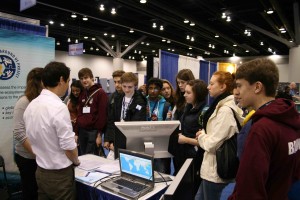 This post was written by by Claire Hornby, Sarah Harper, Robin Ramdeen, Dyhia Belhabib, Frédéric Le Manach and Aylin Ulman and appeared in the newsletter.
This post was written by by Claire Hornby, Sarah Harper, Robin Ramdeen, Dyhia Belhabib, Frédéric Le Manach and Aylin Ulman and appeared in the newsletter.
The American Association for the Advancement of Science (AAAS) held its 178th Annual Meeting in Vancouver from February 16-20, 2012. The theme of this year’s conference was “Flattening the world: building a global knowledge society”. Sea Around Us Project members were among the 8,000 attendees, participating and presenting in numerous symposium sessions and volunteering at the Project’s booth in the exhibition hall. Additional notable sessions were presented by other members of the Fisheries Centre.
Highlights from the conference included a symposium titled “Underreported yet overoptimistic: fisheries catch reconstructions and food security”, organized by Sea Around Us Project members Dr Dirk Zeller and Sarah Harper. Dirk gave an informative presentation outlining the methods used in reconstructing countries’ fisheries catches, while Frédéric Le Manach expanded on the importance of this task for tackling issues of human rights and ethics. Frédéric explained that fishing access agreements between the European Union and host countries, citing the example of Madagascar, are perpetuating socio-economic inequalities between most and least-developed countries. The catch reconstruction work for Madagascar made the first step toward revealing some of these inequalities, which suggest that fishing access agreements need to be revised to be more ethical.
In the final part of the session, Nicola Smith, a graduate of the University of British Columbia now working in the Caribbean, described her reconstruction of the catches of the Bahamas. She found that recreational fisheries catches, which account for a large
proportion of the country’s total catches, are entirely missing from official statistics. As is the case for much of the Caribbean, the economy of the Bahamas is dominated by tourism – visitors want to fish and eat seafood as part of their holiday experience. This places intense demand on the local marine environment. The take-home message of this symposium was that proper accounting of all fisheries sectors is a key component of managing fisheries resources in both a sustainable and ethical manner. The examples that Dirk, Frédéric and Nicola presented are just a handful of the 150 or so countries that will be reconstructed by the end of this year. There will definitely be many more interesting stories to tell once the reconstruction of catches for all fishing countries is complete!
Another successful symposium was “Whole-ocean economics” organized by Dr Rashid Sumaila. He revealed the newly developed Eco2 Index, which measures the economic and environmental health of developed and developing countries. Dr William Cheung also presented a conservation risk index that combines economic figures and fisheries population growth rates to reveal the economics/conservation trade-offs of fishing. It was clear from the model that not all developed countries are doing well in terms of conservation. The audience showed a particular interest in the “Whole-ocean economics” session and there was plenty of participation by professors, researchers, non-governmental organization representatives and students. A roundtable session followed the presentations and questions relating to fisheries, marine protected areas and governance generated stimulating discussions. This session succeeded in highlighting the commitment of the Fisheries Centre members to global research and collaboration.
Another symposium organized by the Sea Around Us Project was titled “Leveling the global playing field: global inferences from reliable global samples”. Dr Kristin Kleisner, a postdoctoral fellow with the Sea Around Us Project and organizer of the session, explained how to design sampling methods and why it is important to infer scientifically sound global trends. Dr Thomas Lovejoy, from the H. John Heinz III Center for Science, Economics, and the Environment in Washington DC, then discussed the use of technology to monitor biodiversity trends and species extinction. Closing the symposium, Dr Molly Jahn, from the University of Wisconsin, stressed the need to build a global information system to meet our future needs.
The Sea Around Us Project booth was also a major success. It allowed Project members to share their work with a diverse audience. For Claire Hornby, the AAAS was her first major science conference, and she was excited and nervous to have a chance to interact with scientists of various disciplines from all over the world. It was amazing to see the wide range of people that approached the booth, eager to hear about the Project’s work. Surprisingly, it seemed everyone – no matter if they were a budding scientist of five years old or an established professor – wanted to learn something about fisheries. The majority of attendees that approached the booth knew about the current state of the world’s oceans and the decline of many commercial fisheries. Family day at the AAAS brought many up-andcoming scientists to the booth. Robin Ramdeen, who volunteered that day, described how wonderful it was to see so many primary school children intrigued by the Sea Around Us Project’s display of ocean primary productivity. Their level of understanding of the importance of plankton for producing the energy upon which marine food webs are based was astounding. These inquisitive junior scientists answered their own questions about where energy comes from, both on land and at sea, and about how phytoplankton and zooplankton are essential to the diet of fish via the food web. Importantly, they were able to connect how changes in primary production could affect one of the ocean’s top predators: humans.
These were just a some of the highlights of Sea Around Us Project’s and the Fisheries Center’s contributions to the 2012 AAAS meeting. The conference was yet another example of how committed the Sea Around Us Project is not only to doing good research, but also to communicating its work to the world.

